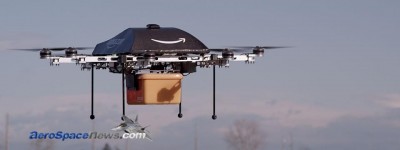FAA Announces Final Commercial Drone Regulations
"New Commercial Drone Rules Won't Apply To Model Aircraft, Says FAA"
 The Federal Aviation Administration (FAA) announced it has published the final regulations for Part 107 operational rules of commercial drone operations (small unmanned aircraft systems or UAS).
The Federal Aviation Administration (FAA) announced it has published the final regulations for Part 107 operational rules of commercial drone operations (small unmanned aircraft systems or UAS).
"We are part of a new era in aviation, and the potential for unmanned aircraft will make it safer and easier to do certain jobs, gather information, and deploy disaster relief," said U.S. Transportation Secretary Anthony Foxx.
While the FAA refers to the development as a singular new rule, it is really a body of new governing regulations for the commercial operation of drones.
Scheduled to become effective in late August 2016, the "rule" establishes regulations for commercial unmanned aircraft systems weighing less than 55 pounds.
The FAA claims it is designed, "to minimize risks to other aircraft and people and property on the ground."
Key Details of Commercial Drone Operations Rules
- It seems the "commercial drone pilot's license" will be called a "remote pilot certificate"
- The regulation will be known as Part 107.
- Pilots are required to keep an unmanned aircraft within visual line of sight.
- Operations are allowed during daylight and during twilight if the drone has anti-collision lights.
- Flights are prohibited over unprotected people on the ground who aren't directly participating in the UAS operation.
- A person actually flying a drone must be at least 16 years old and have a remote pilot certificate with a small UAS rating, or be directly supervised by someone with such a certificate.
- To qualify for a remote pilot certificate, an individual must either pass an initial aeronautical knowledge test at an FAA-approved knowledge testing center or have an existing non-student Part 61 pilot certificate. If qualifying under the latter provision, a pilot must have completed a flight review in the previous 24 months and must take a UAS online training course provided by the FAA.
- The TSA will conduct a security background check of all remote pilot applications prior to issuance of a certificate.
- Part 107 will not apply to model aircraft.
The Agency says it will offer a process to waive some restrictions if an operator proves the proposed flight will be conducted safely under a waiver. The FAA will make an online portal available to apply for these waivers in the months ahead.
Apparently there are more commercial drone regulations to come. "With this new rule, we are taking a careful and deliberate approach that balances the need to deploy this new technology with the FAA's mission to protect public safety," said FAA Administrator Michael Huerta. "But this is just our first step. We're already working on additional rules that will expand the range of operations."
Operators are responsible for ensuring a drone is safe before flying, but the FAA is not requiring small UAS to comply with current agency airworthiness standards or aircraft certification. Instead, the remote pilot will simply have to perform a preflight visual and operational check of the small UAS to ensure that safety-pertinent systems are functioning property. This includes checking the communications link between the control station and the UAS.
Although the new rule does not specifically deal with privacy issues in the use of drones, and the FAA does not regulate how UAS gather data on people or property, the FAA is acting to address privacy considerations in this area. The FAA strongly encourages all UAS pilots to check local and state laws before gathering information through remote sensing technology or photography.
Model aircraft operators must continue to satisfy all the criteria specified in Section 336 of Public Law 112-95 (which will now be codified in part 101), including the stipulation they be operated only for hobby or recreational purposes.

 Welcome to AeroSpaceNews.com, the world's first
Welcome to AeroSpaceNews.com, the world's first